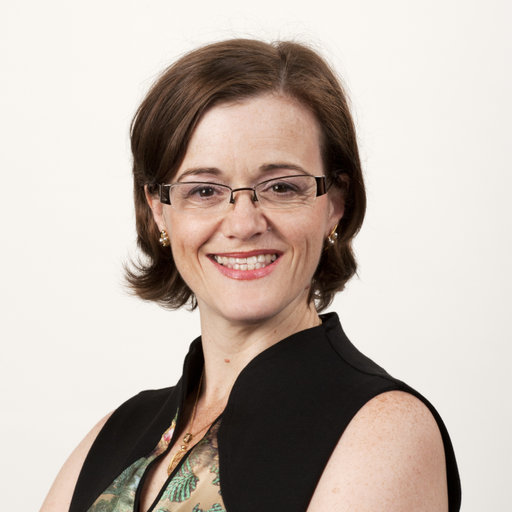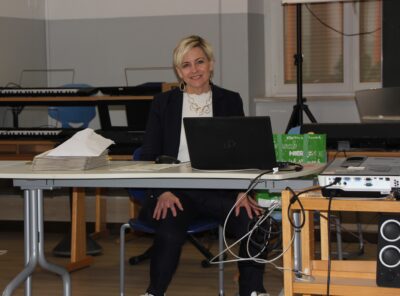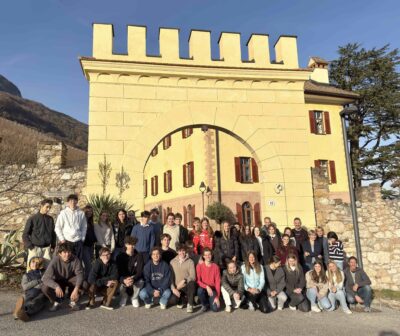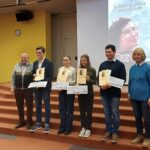Interview with Nayr Ibrahim
Forging New Paths
Yvonne Domesle and Monika Marinello spoke to Nayr Ibrahim, one of the speakers at the 8th Conference for English teachers at all school levels „Forging New Paths“, which will take place on 17th November 2023 at the EURAC in Bolzano.
Yvonne Domesle & Monika Marinello: In South Tyrol we have three separate school systems, one for each language group – German, Italian, Ladin – and every pupil learns at least three languages from primary school onwards. Recently, however, our teachers have had to deal with many more languages from all over the world in their classrooms. How can we support EFL teachers who often feel overwhelmed by the linguistic and cultural diversity of their learners?

Nayr Ibrahim: Supporting EFL teachers dealing with linguistic and cultural diversity in their classrooms requires a multifaceted approach that addresses both personal, practical and pedagogical aspects.
Teachers need to lose their fear of not knowing or understanding all of the languages in the classroom and give power over to the learners to express themselves in the best way they know. But at the same time they need to develop knowledge of multilingualism as a complex concept, the impact of language ideologies on learning and teaching, and translanguaging. They also need to use strategies for teaching English to multilingual learners, which can include techniques for differentiated instruction, intercultural communication skills, and visual methods for uncovering the hidden multilingualism in schools. They should integrate multicultural and multilingual content to engage and connect with students‘ backgrounds and use resources that ensure representation, such as dual-language picturebooks. They can leverage technology to support EFL teaching. Educational apps, online language learning platforms, and digital resources can enhance students‘ language skills and make learning more engaging.
Parents and the community are important in supporting EFL students‘ language development. It is crucial to engage parents in the learning process and create opportunities for them to share their linguistic and cultural knowledge.
Professional development and training are key! Whenever they can, teachers should attend regular training sessions and workshops focused on strategies for teaching English to multilingual learners. A collaborative approach, where teachers can share resources, lesson plans, and best practices for teaching English in multilingual settings, is also ideal.
Ultimately, teachers need to recognize the social and emotional challenges that multilingual learners might face and provide resources and strategies to create a supportive and emotionally safe classroom environment.
The priority is the well-being of the learners and the teachers.
This is the first Conference for English teachers in South Tyrol since the pandemic. Do you think the pandemic has changed the outlook on teaching and learning? What “new paths” should we be “forging”?
I think the pandemic has indeed significantly impacted the field of education, including teaching and learning English. It has forced educators and institutions to adapt to new circumstances and challenges, which in turn has led to changes in outlook and practices. With the pandemic, we have all learnt that learning can and does happen online as well as in the classroom, which has influenced the way we think about learning. It has become more flexible, independent, personalised, dynamic, creative, adaptable, but this has also highlighted several problems, for example, the importance of training teachers and educators in creating effective integrated online, in-person and hybrid learning environments; the digital divide, which accentuates exclusion and poverty and the need to centre-stage digital literacy for all; the importance of incorporating strategies that foster well-being and resilience in these new learning environments.
The pandemic reinforced the interconnectedness of the world, at a global level. Hence, we need to integrate global perspectives into our teaching, foster a deeper understanding of global issues, cultures and contexts. This could involve collaboration with educators from different regions, virtual exchange programmes, and cross-cultural projects, where the children are also involved in connecting with children from different parts of the world.
We need to embrace these new digital pathways and learn how to make them work for us to make a difference in the classroom before they take over and manipulate our young minds.










